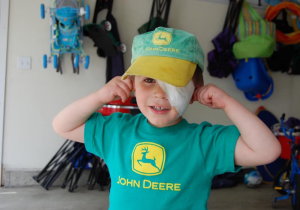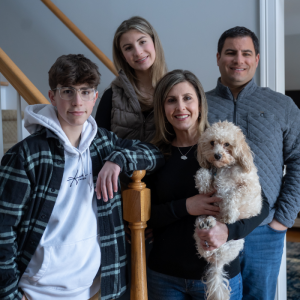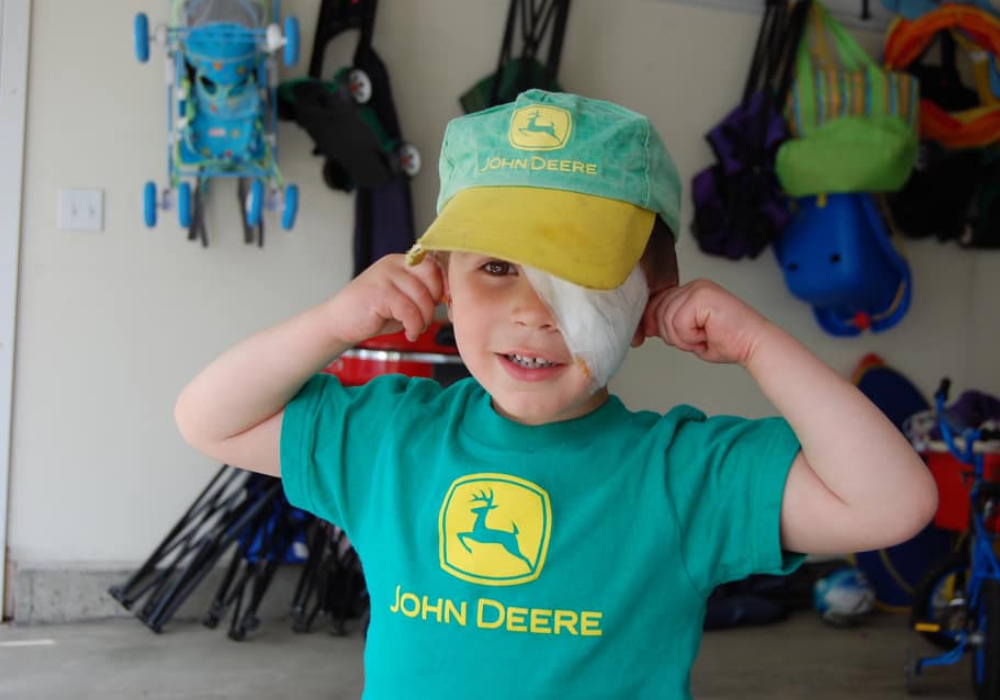Specs for Little Heroes:
Helping Child Eye Cancer Survivors One Pair of Glasses at a Time
By Mary Hawkins / Photographed by Carla Hernandez Ten Eyck
When it comes to childhood cancers, retinoblastoma probably isn’t one that’s on most people’s radar. Retinoblastoma is a rare cancer that begins in the back part of the eye, the retina, and can spread up the optic nerve and into the brain. It affects 1 in 10,000 kids each year, and it only occurs in children ages 5 and under. In 2011, at the age of just 3, Erin and Adam LaFleche’s son, Justin, became one of those 1 in 10,000.
Justin’s Story

“We noticed a white glare in his eye and didn’t really think anything of it,” Erin explains. She continues, “We thought maybe his eyes were continuing to change colors, and maybe they would turn green, like Adam’s. He was acting perfectly healthy, so we really didn’t think it was an issue, and certainly nothing like retinoblastoma was on our radar. But then, we saw it again, and I told Adam, ‘I feel like I see something funny in his eye.’”
The couple took Justin to the pediatrician, who kind of “brushed it off like it was nothing” and made Erin feel like she was being a nervous mom. At the advice of Erin’s mother, she and Adam decided it was a good idea to seek out a second opinion, just to be on the safe side. They were referred to a pediatric ophthalmologist, and that appointment proved to be the day their lives changed forever.
Erin recalls the moment they received the worst news of their lives. After examining Justin, she explains, “The doctor came back into the office and said,’ He’s blind in that eye, it looks like the retina’s possibly detached. It’s either Crohn’s disease or retinoblastoma.” It all seemed so surreal to Erin at the time. She recalls, “I couldn’t believe what I was hearing,” and she was so stunned, she even got sick in the wastepaper basket in the doctor’s office.
A few days later, they took Justin to see Dr. Miguel Materin, Ocular Oncologist at Yale New Haven Hospital, who confirmed that Justin did indeed have retinoblastoma. They were told that Justin would need to have enucleation surgery to have his eye removed immediately before the cancer spread to his brain. As you can imagine, they were in complete shock, so the family traveled to New York City to Sloan Kettering Hospital to get a second opinion. Doctors there echoed Dr. Materin’s advice, and Erin and Adam opted to return to Yale New Haven to have the surgery performed by Yale’s Ocular Surgeon, Dr. Flora Levin.
On the day of the enucleation surgery, the couple remained as calm, cool, and collected as possible for Justin’s sake. Erin notes, “We just tried to focus on the fact that we were ridding him of cancer and tried not to be too emotional about him losing his eye.”
Little did they know just how brave and resilient this amazing kid would turn out to be. Erin adds, “He just showed us how to do it,” meaning getting through the aftermath of what had just happened. She adds, “You know, everyone says, ‘Oh, you guys are so strong.’ But we aren’t. You just do what you have to do. You put one foot in front of the other. And that’s how Justin was. It was a day surgery, and he didn’t even sleep over in the hospital. He came back home with a big patch over where his eye used to be. And by the next day, he wanted to race around on his John Deere tractor. And we said, ‘Justin, slow down, slow down!’ And at 3 ½, he said, ‘Mommy, slow makes me sad, fast makes me happy.’ And that’s just his motto for life.”
There was a specific day after the surgery where Erin was having a particularly hard time, as she was mourning the loss of Justin’s eye and was still in shock at what had happened. Her daughter, Juliana, was just 5 years old at the time and noticed her crying and wanted to comfort her. She came to her and said, “Mommy, you know, God gives you two eyes. Because if something happens to one, you have the other. God gives you two ears because if something happens to one, you have the other.” It was as if she was telling her mom, “Don’t worry, Justin’s gonna be fine.” And fine he was and still is. Now 14, Justin is not only cancer-free, but he’s an athlete who loves skiing, hiking, soccer, and lacrosse.
How Specs for Little Heroes Was Born

When kids lose an eye to retinoblastoma, it’s even more cucial to protect their still existing eye, and that’s why they’re outfitted with a special pair of glasses. These glasses have to have polycarbonate lenses, which won’t crack or shatter, to ensure the remaining eye is protected.
Erin and Adam took Justin to the optical shop to get his special glasses, and that’s when they found out they weren’t covered by insurance. Erin recalls, “I was still in a really bitter part of my life. I thought, ‘What do you mean they’re not covered? My kid only has one eye! This is ridiculous.’ And then I started to think, ‘Wow. There are maybe some people who don’t have the means to pay out of pocket. These kids deserve the Mercedes of glasses, let alone not being able to afford them at all.’”
Not too long after that day, an idea popped into Erin’s mind. She explains, “Faith has always been a really important thing to me, but it comes in waves. And I really feel like God sent me a message about this idea for Specs for Little Heroes because I was really having a hard d, and it depicts two children wearing glasses. Erin points out, “We made it a point not to put Justin’s face on the logo or make it about him. He doesn’t want any sympathy, but we want to show him that when something bad happens to you, you can push through it and help other people – and helping other people has helped us heal. It’s made us see how a lot of people have it a lot worse than you and giving to others makes it all feel a little less difficult.”
As Specs for Little Heroes has grown over the years, Erin and Adam have since formed partnerships with three eyeglass manufacturers who make people’s donations stretch so they can buy more glasses and help more kids in need. When someone donates $100, they’re able to purchase $200 worth of glasses. Through personal donations, events, and fundraisers, the organization shows no signs of stopping as they continue to help children all over the world recover after enucleation surgery.
Always Trust Your Gut
If there’s one piece of advice that Erin could give to parents, it’s to always trust your gut if you think there might be something wrong with your child. She says, “Don’t blame the doctor, but don’t let a doctor dismiss your gut instinct. If you feel like something’s not right, don’t hesitate to speak up and ask for a referral to a specialist. And when you’re going through something, just know that there are people out there who truly care for you and will support you.”
Erin continues, “It’s all about paying it forward. People were there for us. They embraced us and literally carried us through when we felt like we couldn’t even take a step forward. And then when we were out of our dark place, to be able to take an idea and create the support system like we have with Specs for Little Heroes makes it not feel so in vain.”
It’s also important to note just how serious and fast-moving a cancer retinoblastoma is, and it only develops in children who are ages 1 to 5. Unfortunately, it’s not something that all pediatricians will look for or test for. Parents should keep in mind the phrase, “Know the glow.” If you happen to notice a glare or light in your child’s eye, it’s not something that should be taken lightly. Call your doctor and make an appointment to have their eyes examined right away. As Erin says, “Moms need to be vigilant about being their child’s best advocate and having their eyes checked.”
For any parents who have a child going through any sort of illness or health challenge, Erin has some words to live by. “As we tell Justin, if you can get through this, you can probably get through anything. You just try to keep your kid strong and know that everybody has a hurdle. And if we all try to help each other, then you know we can get through whatever it is.”
The LaFleches are longtime residents of Ellington, Connecticut. Donations to help purchase glasses for children with retinoblastoma can be made through the Specs for Little Heroes website, www.specsforlittleheroes.com.







More Stories
Autism Families CONNECTicut Steps Up for the Local Community Building a Nonprofit From the Ground Up
Hospital for Special Care’s Ivan Lendl Adaptive Sports Camp
Special Olympics Connecticut: Supporting and Inspiring a Special Community